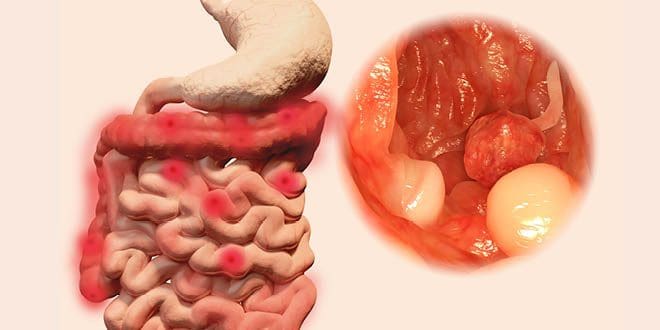Polyps are just a growth of tissue that develops on the inner lining of the intestine. A polyp can be raised and look like a pea on a stalk, or it can be flat.
There can be just one polyp or multiple polyps. Most polyps are benign, but occasionally a polyp may develop into cancer. Not all bowel polyps are harmful, but some have the potential to develop into cancer if not monitored. Polyps tend to occur in the large intestine, called the colon; therefore they are commonly referred to as colonic polyps.
The discovery of polyps in your intestine should be taken seriously, because if dealt with promptly, you may be able to avoid the development of more serious bowel conditions.
There are 3 main types of colon polyps:
- Ordinary polyps. These polyps commonly develop between the ages of 40 and 60. Most are not cancerous, but if not monitored, they could become cancerous in around 10 years. If members of your family have these polyps, you are more likely to develop them too.
- Hereditary familial polyposis. This is a genetic condition where there can be hundreds or thousands of polyps in the colon. These polyps tend to grow very early in life, and they almost certainly become cancerous. Luckily the condition is not very common.
- Hereditary non-polyposis colorectal cancer. This is also a genetic disorder but isn’t as common as familial polypsosis. Again, the risk of colon cancer is high. This condition is also referred to as Lynch Syndrome and close family members are also at heightened risk of breast and ovarian cancer.
What are the risk factors for developing bowel polyps?
- Being overweight
- Lack of physical exercise
- Advancing age, particularly over the age of 50
- History of constipation
- Having a family member who has had bowel polyps or bowel cancer
- Moderate to high alcohol intake
- Vitamin D and selenium deficiency, which are very common deficiencies
What are the symptoms of bowel polyps?
In most cases there are no symptoms at all, or the symptoms are so mild that they are ignored. A lot of people put up with disturbed digestive function their whole lives, and therefore don’t notice the subtle symptoms of bowel polyps.
If there are symptoms, the most likely ones include:
- Constipation or diarrhea that lasts more than 7 days.
- Rectal bleeding and if you notice blood on the toilet paper after having a bowel motion, you should see your doctor. It might just be due to hemorrhoids, but it could be more serious.
- Unusually dark colored stools can mean blood in the stool and you should see your doctor.
How do doctors treat bowel polyps?
If your doctor has discovered polyps in your colon, several of them will be removed and viewed under a microscope. This is necessary in order to determine if they are cancerous. People with a history of polyps need to have regular colonoscopies to check the colon and see if the polyps regrow.
If you have had a bowel polyp, or a family member has had bowel polyps, it is vital to see your doctor regularly for a colonoscopy. If treated in the early stages, polyps are harmless and easily removed.
Strategies to prevent bowel polyps
- Eat lots of vegetables. Vegetables are an excellent source of fibre that is not harsh and scratchy to the bowel wall. Many people do not tolerate grains or legumes well, yet vegetables are easy to digest and they provide valuable bulk to the stool. It is very important to keep your bowel moving each day. Ideally you would have between one and three bowel motions each day. The longer the waste is allowed to stay in contact with your bowel wall, the greater the risk that polyps will form.
- If you struggle with constipation, you may need help from a gentle bulking and gluten free laxative like Fibertone. The ingredients in Fibertone help to sweep the colon clean and they are not habit forming. This is good because it means Fibertone will not weaken your bowel. Chia seeds are also excellent for those with constipation and should be eaten regularly.
- Try to avoid sitting for long periods of time. Many of us have a job where we must sit all day and that is unavoidable. Try to go for a walk before or after work, and try to make your weekends active. The exercise doesn’t have to be strenuous; it just has to be regular. This will help all bowel problems.
- Try to drink between 8 and 10 glasses of water or herbal tea each day. That will have a cleansing effect on your bowel and soften your stool. You could put 2 tablespoons of chia seeds into a glass of water or milk and leave it to thicken for half an hour. Chia seeds are soothing to the bowel wall and they help to keep you feeling full and less likely to snack.
- There are a number of health supplements which may be of assistance for those who are at risk of getting bowel polyps, so please contact our naturopaths on 02 4655 8855 for more information.
- Make sure you don’t have elevated blood insulin levels. Insulin is a growth promoting hormone. It encourages more rapid growth of polyps, and also tumors, both benign and malignant. Having elevated blood insulin is also known as insulin resistance, metabolic syndrome, Syndrome X and pre-diabetes. The best way to lower insulin is to follow a low carbohydrate eating plan and exercise regularly.
This is an excerpt from Dr Cabot’s book, “Healthy Bowel, Healthy Body“.









Leave A Comment